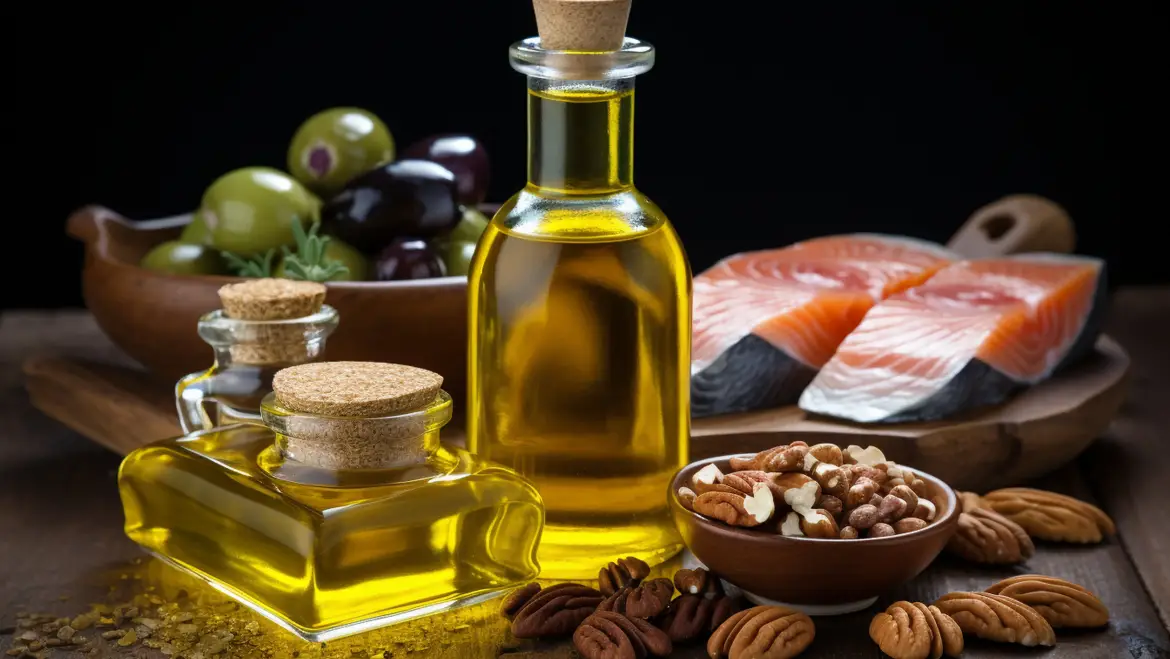Cholesterol is a natural fatty substance in the body, essential for cell building and hormone production. However, elevated cholesterol levels can increase the risk of heart disease, including heart attacks and strokes.
The foods you eat play a significant role in maintaining a healthy cholesterol level. Nutrient-rich choices, from vegetables to healthy fats, can naturally support heart health and improve lipid balance. This guide explains why cholesterol matters, highlights the unique benefits of olive oil, and outlines foods that can help reduce cholesterol naturally.
What Is Cholesterol and Why Does It Matter
Cholesterol is a waxy, fatty substance (lipid) found in every cell of the body and carried through the bloodstream by lipoproteins. It serves multiple vital functions that support overall health:
- Produces hormones, including sex hormones, and vitamin D.
- Helps form the cell membrane, the protective layer around each cell, regulating what enters and leaves the cell.
- Supports the liver in producing bile, a digestive fluid that helps break down fats and absorb nutrients after meals.
While the body needs cholesterol to function properly, it typically produces enough on its own. Excessive levels, especially of low-density lipoprotein (LDL) cholesterol, can lead to plaque buildup in the arteries, increasing the risk of heart disease, heart attacks, and strokes.
Types of Cholesterol
- Low-Density Lipoprotein (LDL):
Often called “bad” cholesterol, high levels can contribute to plaque buildup in the arteries, increasing the risk of heart disease and stroke.
- High-Density Lipoprotein (HDL):
Known as “good” cholesterol, it helps carry excess cholesterol from the bloodstream to the liver, where it can be safely removed from the body.
In India, approximately 31% of adults struggle with high cholesterol, with 31% of men and 30% of women affected.
Understanding cholesterol and how it affects your overall health is important. By making well-informed dietary choices, you can help maintain a healthy cholesterol balance. This, in turn, supports overall heart health and reduces long-term cardiovascular risks.
Top 11 Foods to Reduce Cholesterol Naturally
Below are some of the best foods known to reduce cholesterol:
1. Fatty Fish
Fatty fish such as salmon, mackerel, and sardines are rich in omega-3 fatty acids, which help raise HDL cholesterol while lowering triglycerides and LDL cholesterol, factors that may reduce the risk of cardiovascular disease.
For maximum benefit, prepare fish by steaming or stewing, and avoid frying, as it can increase the risk of heart disease and stroke.
2. Olive Oil
Extra virgin olive oil is one of the best foods to reduce cholesterol. It’s packed with monounsaturated fats, primarily oleic acid, and antioxidants. Oleic acid, which makes up about 55-83% of the oil’s total fat content, helps regulate cholesterol metabolism by reducing the body’s production of new cholesterol. In addition, substituting saturated fats such as butter with olive oil has been shown to lower LDL cholesterol while maintaining, or even increasing, HDL cholesterol.
3. Nuts
Nuts, including almonds, walnuts, cashews, peanuts, and pistachios, are well known for their role in improving cholesterol profiles. Regular consumption has been shown to lower LDL cholesterol, triglycerides, and overall cholesterol levels.
Walnuts are especially beneficial, as they are rich in omega-3 fatty acids that help reduce triglycerides, lower LDL cholesterol, ease inflammation, and support better circulation by reducing the risk of blood clots. Almonds, on the other hand, provide phytosterols, plant compounds that naturally block cholesterol absorption and contribute to healthier LDL levels.
Consistently adding a small handful of nuts to your daily diet has also been linked to a 30% reduction in the risk of cardiovascular disease.
4. Whole Grains
Whole grains are an essential part of a balanced Indian diet. They provide fibre, vitamins, minerals, and plant compounds that support healthy cholesterol levels and reduce the risk of heart disease. Oats and barley are especially effective, as their beta-glucan content has been shown to lower LDL cholesterol.
5. Legumes
Legumes, or pulses, help lower LDL levels and reduce the risk of several health conditions, including inflammation, hypertension, diabetes, and obesity. Try swapping legumes such as lentils, peas, and soybeans for refined grains and processed foods to better support heart health over time.
6. Leafy Greens
Spinach and kale are dark leafy greens rich in lutein and other carotenoids, which have been linked to a lower risk of heart disease. They also help remove excess cholesterol from the body, helping to keep cholesterol levels under control.
7. Fruits
A heart-healthy diet should always include fruits as a key component. They are a good source of soluble fibre, which helps lower cholesterol by promoting its removal from the body and reducing how much the liver produces. For example, citrus fruits, apples, strawberries, and grapes are rich in pectin, a type of soluble fiber that has been shown to reduce LDL cholesterol by up to 10%.
Berries such as strawberries, cranberries, and blueberries also provide anthocyanins and phytosterols, powerful compounds with antioxidant and anti-inflammatory properties. Regularly eating these fruits can support healthier cholesterol levels by lowering LDL and raising HDL.
8. Avocados
This nutrient-rich fruit offers heart-healthy monounsaturated fats, potassium, and fibre. Regular consumption of avocados has been linked to lower LDL cholesterol and triglycerides, while supporting higher HDL levels. They are also highly versatile and can be enjoyed in sandwiches, salads, desserts, or even as a simple spread.
9. Vegetables
Just like fruits, vegetables are an essential part of a healthy diet. They are packed with fiber, antioxidants, and other nutrients that help improve LDL, HDL, and total cholesterol levels. Regular consumption of vegetables can also lower blood pressure and triglycerides. Some of the best choices for supporting cholesterol health include cauliflower, okra (lady’s finger), eggplant (brinjal), broccoli, and garlic.
10. Cocoa
Studies suggest that eating dark chocolate or cocoa may help lower LDL cholesterol and blood pressure while raising HDL cholesterol. Cocoa is rich in polyphenols, powerful antioxidants that support healthy cholesterol levels in the body. However, it is important to choose varieties with 75-85% cocoa and minimal sugar, as excess sugar can have negative effects on health.
11. Tea
Green tea is rich in antioxidants called catechins that help reduce LDL and total cholesterol, ease inflammation, and protect cells from damage. Black tea and white tea also offer similar heart-protective benefits. For maximum results, drink unsweetened tea and make it a regular part of your routine.
How Olive Oil Supports Heart Health
Olive oil, especially extra virgin, is rich in nutrients like monounsaturated fats (mainly oleic acid), polyphenols, vitamin E, and other natural compounds. These work together to protect the heart by lowering inflammation, fighting oxidative stress, and reducing the chance of blood clots. Studies show that olive oil can improve cholesterol levels, blood pressure, blood sugar control, and insulin sensitivity.
It may also benefit gut health by encouraging a better balance of good bacteria, which in turn supports heart and metabolic health. The key components of olive oil, including its healthy fats and polyphenols, are linked with a lower risk of heart disease and longer life expectancy.
When compared with butter, ghee, or refined oils, olive oil offers a clear advantage in managing cholesterol and promoting cardiovascular health. Adding it to your curries, salads, chutneys, and other Indian meals is an easy way to use olive oil for body health naturally.
Conclusion
Managing cholesterol doesn’t always call for major changes. In fact, small, steady adjustments to your daily diet often make the greatest impact. Foods such as fatty fish, nuts, whole grains, legumes, fruits, and vegetables can help lower LDL cholesterol and strengthen heart health. Olive oil, in particular, stands out from other cooking fats because of its unique mix of healthy fats and antioxidants that protect the heart and improve cholesterol balance.
By making these foods a regular part of your meals, you can gradually improve cholesterol levels, lower the risk of heart disease, and support long-term well-being.
The key is not strict restriction, but smarter, nutrient-rich choices that bring both health and flavour to the table.
Frequently Asked Questions (FAQs)
1. Which Cooking Oil Is Best for Cholesterol?
Extra virgin olive oil is among the best for cholesterol. It lowers LDL, supports HDL, and offers antioxidants that protect the heart, making it healthier than other cooking oils.
2. What Is Olive Oil’s Role in Managing Cholesterol Levels?
Olive oil, rich in oleic acid, polyphenols, and vitamin E, helps lower LDL and maintain HDL levels. Its anti-inflammatory and antioxidant effects also protect blood vessels and support overall heart health.
3. What to Drink to Reduce Cholesterol?
Green tea, black tea, soy milk, vegetable juice, and white tea are all excellent choices that may help reduce cholesterol and support better heart health.
4. Which Fruit Is Best for Cholesterol?
Apples, grapes, citrus fruits, and berries are among the best fruits for cholesterol. They are rich in soluble fibre and antioxidants, which help lower LDL cholesterol.
5. How Much Olive Oil Should I Take Daily for Heart Health?
Studies suggest 1-2 tablespoons of olive oil daily can support cholesterol balance, reduce inflammation, and promote heart health as part of a balanced diet.


